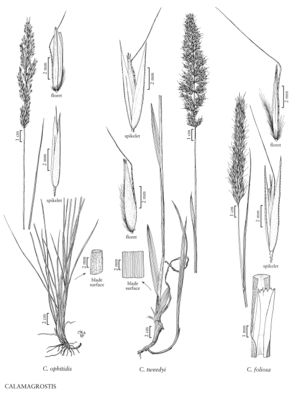Difference between revisions of "Calamagrostis ophitidis"
FNA>Volume Importer |
imported>Volume Importer |
||
| (5 intermediate revisions by 2 users not shown) | |||
| Line 4: | Line 4: | ||
|publications= | |publications= | ||
|common_names=Serpentine reedgrass | |common_names=Serpentine reedgrass | ||
| + | |special_status={{Treatment/ID/Special_status | ||
| + | |code=E | ||
| + | |label=Endemic | ||
| + | }} | ||
|basionyms= | |basionyms= | ||
|synonyms={{Treatment/ID/Synonym | |synonyms={{Treatment/ID/Synonym | ||
|name=Calamagrostis purpurascens var. ophitidis | |name=Calamagrostis purpurascens var. ophitidis | ||
| − | |authority= | + | |authority= |
| + | |rank=variety | ||
}} | }} | ||
|hierarchy=Poaceae;Poaceae subfam. Pooideae;Poaceae tribe Poeae;Calamagrostis;Calamagrostis ophitidis | |hierarchy=Poaceae;Poaceae subfam. Pooideae;Poaceae tribe Poeae;Calamagrostis;Calamagrostis ophitidis | ||
| Line 29: | Line 34: | ||
-->{{#Taxon: | -->{{#Taxon: | ||
name=Calamagrostis ophitidis | name=Calamagrostis ophitidis | ||
| − | |||
|authority=(J.T. Howell) Nygren | |authority=(J.T. Howell) Nygren | ||
|rank=species | |rank=species | ||
| Line 36: | Line 40: | ||
|basionyms= | |basionyms= | ||
|family=Poaceae | |family=Poaceae | ||
| + | |illustrator=Cindy Roché;Hana Pazdírková | ||
| + | |illustration copyright=Utah State University | ||
|distribution=Calif. | |distribution=Calif. | ||
|reference=None | |reference=None | ||
|publication title= | |publication title= | ||
|publication year= | |publication year= | ||
| − | |special status= | + | |special status=Endemic |
| − | |source xml=https:// | + | |source xml=https://bitbucket.org/aafc-mbb/fna-data-curation/src/200273ad09963decb8fc72550212de541d86569d/coarse_grained_fna_xml/V24/V24_1005.xml |
|subfamily=Poaceae subfam. Pooideae | |subfamily=Poaceae subfam. Pooideae | ||
|tribe=Poaceae tribe Poeae | |tribe=Poaceae tribe Poeae | ||
Latest revision as of 17:21, 11 May 2021
Plants usually with sterile culms; usually cespitose, often with rhizomes 2-15 cm long, 1-3 mm thick. Culms (30) 55-80(100) cm, unbranched, scabrous beneath the panicles; nodes (1)2(5). Sheaths and collars usually scabrous, rarely smooth; ligules (0.5)2-5.5(7) mm, usually truncate, entire to slightly lacerate; blades (8)10-20(27) cm long, (1.5)2-3(4) mm wide, usually involute, abaxial surfaces usually scabrous, rarely smooth, adaxial surfaces scabrous, glabrous or sparsely hairy, both surfaces with abundant white glands between the veins, visible only with magnification. Panicles (6)8-11(15) cm long, (1)1.2-1.5 cm wide, contracted, mostly erect, pale green to green; branches 2-4(4.5) cm, scabridulous, usually spikelet-bearing to the base. Spikelets (4.5)5-7(8) mm; rachilla prolongations about 1.5 mm, hairs 1-2 mm. Glumes keeled, usually scabrous over the entire surface, rarely only the keels scabrous distally, lateral veins prominent, apices acute to acuminate; callus hairs 1-1.5(2) mm, 0.2-0.4 times as long as the lemmas, sparse; lemmas 4.5-6.5 mm, 0-2 mm shorter than the glumes; awns 5-6(8) mm, attached to the lower 1/10 – 1/5 of the lemmas, exserted less than 2 mm, stout, distinguishable from the callus hairs, bent; anthers (2.5)3-3.5(4) mm. 2n = 28.
Discussion
Calamagrostis ophitidis grows in meadows, seeps, grasslands, and chaparral, as well as in coniferous forests, on serpentine outcrops and soils, at 50-1100 m. It is known only from Sonoma, Marin, Mendocino, Lake, and Napa counties in California.
Selected References
None.
